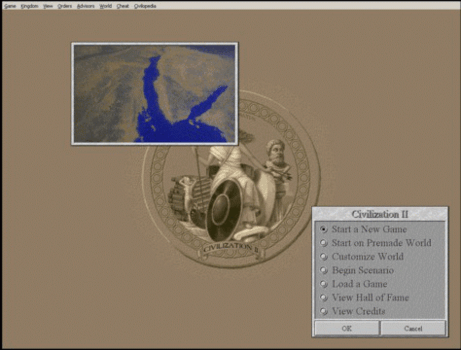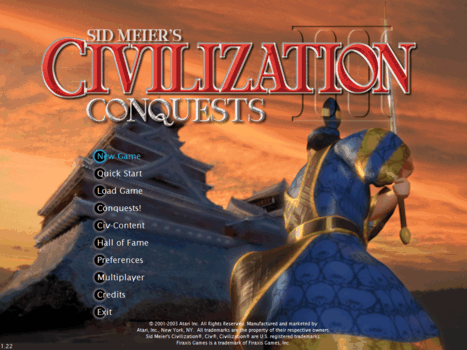There was a time we were happy to have 16 colors and like 320×200 and even the idea of Super Video Graphics Array was mental. Nowadays, it became tremendously hard to have fun playing games from this era, considering how our standards obviously changed over years. For instance, the first Real Time Strategy (RTS) game I ever played was Dune II, released in 1992: simple tasks like moving units are so painy to achieve that in no way I’m able to play even one short game.
Yesterday, I tried a game of Civilization, released in 1991, and found no major interface issue. I was also surprised, even though I played a lot to this one back in the nineties, to find a damn well designed and polished gameplay. Diplomacy, science, war, economy: each feature can be toyed with in depth. Clearly, this is a game were you build a Civilization, with a keen understanding of science, geography, history, weaponry, etc. Surely this has to do with the fact the game concept was not created from scratch, but that’s a great achievement nonetheless.
A few years later, in 1996, Civilization II was released. The gameplay was kept unchanged but the interface was greatly improved using Microsoft Windows 95-like widgets. Most notably, the tree of science research is easier to bear with. There was only two real issues, already there in Civilization but less obvious as you tended to play on smaller maps. The first one is the fact that you have a lot of micromanagement involved: you’ll have to build roads, rails, irrigation, etc, on each tile, and it cannot be automated (ahem). The second one is the fact that, to win wars, you’ll have to stack a considerable amount of units, sometimes so many it become a nightmare to handle in plenty of cases (ocean to get across, etc).
Truth is I played Civilization III the other day for the first time, even if it was released in 2001. So I won’t recollect any memories, just say that this version provides two new things: units automation, culture. The first one (auto-explore, auto-improve tiles, etc) was an improvement made obviously necessary by the previous release and was already a reality in the clone named Freeciv. The second one is a well-tought addition, marking the evolution of the game to a less scientist approach while also enlightening the notion of cultural area and frontiers/borders previously missing.
I played numerous times to Civilization IV, released in 2005. There were no radical changes in this version, but, following the addition of culture, the religion appears, which makes the experience even more realistic, providing motives for alliances or wars. There is still the issue with the too big stacks of units though. Rhye’s and Fall of Civilization mod keep the game light: considering all civs rise and fall (quite true), you only play a civ during a short period with 3 civilization-specific goals to reach. So no civilization get overwhelmingly gigantic.
Published one year ago, Civilization V could have a been one step beyond. Could have. This release address the issue of the big stacks of units: units can no longer be stacked, several units can do ranged attacks, cities can defend themselves. It is no longer necessary, neither it is desirable, to build supersized armies. Great. Not so great: the diplomacy is crappy, with less possibilites than in any release I can think of, religion is out. A plausible explanation would be the current trend is to publish half-baked games to, a few month later, sell “downloadable content”/DLC that provides what should have been already included in the game. Take the example of Call of Duty: each year, one release at 60€, then 4 times a year a DLC at 15€: if you want the full experience, while 60€ a year could have been considered not so cheap, you have to spend 120€. Indeed, Civilization is cheaper; fact is Civilization V feels broken with missing parts, unfinished business, not ready for release. A pity.
So what are the alternatives, where’s the sunny side of the street? Freeciv seems to be lagging behind (not talking about graphics; that obvious but that’s not what truly matters here), with no religion, culture and still the big units stacks. Europa Universalis III is worth giving a try. It gives more headaches than any Civilization release just to understand the basic rules, it’s not wonderful eyes candy-wise, but it is complete, with no missing parts at all. The economy goes as far as dealing with colonies and center of trades, diplomacy includes notion of casus belly and infamy (if you declare war without motive, if you ask too much for peace, etc, you’re seen as bad boy, and that influence the others players behavior towards you), religion includes all major religions, holy war, papal influence, etc.
.
(I havent mentioned multiplayer: I think uneasy to have fun in real-time with other humans playing a turn-based game. Freeciv is okay in this regard, though)





